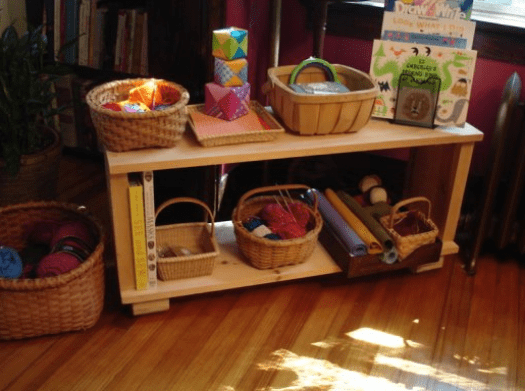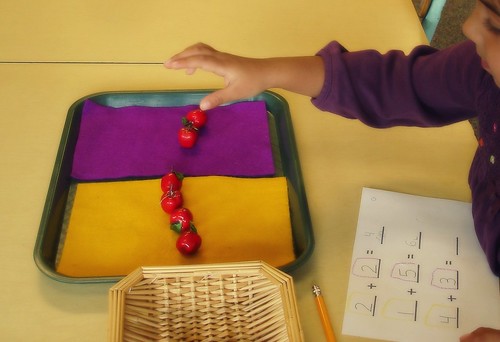by on JUNE 29, 2011

Written by contributor Heather Bruggeman of Beauty That Moves
Montessori education is a philosophy and model created by Maria Montessori, the first woman physician in Italy, in the late 1800s. At its core, Montessori education is designed to promote peace and considers the whole child as well as the environment in its approach.
Montessori education is a philosophy and model created by Maria Montessori, the first woman physician in Italy, in the late 1800s. At its core, Montessori education is designed to promote peace and considers the whole child as well as the environment in its approach.
It has been a primary influence in our family’s lifestyle and educational philosophy.
We’ve heard from some readers that you are interested in Montessori philosophy as it might fit into your homeschool. And some of you were looking for a little inspiration or direction to light the way.
If you are like me, you appreciate things broken down into easy to follow steps.
In 2005, Angeline S. Lillard wrote a book called Montessori: The Science Behind the Genius, in which she discusses whether or not a century old methodology can stand up to modern day scientific research in developmental psychology. Her research led to the understanding that Dr. Montessori’s ideas were, and still are, a very effective holistic approach to educating a child.
It’s an academic way of saying that Maria Montessori knew what she was doing.
In Lillard’s book she covers Eight Principles of Montessori Education. Today we will look at those and think about how they may fit into your homeschool.
The 8 Principles of Montessori Education
1. Movement & Cognition
Movement and cognition are closely entwined, and movement can enhance thinking and learning.
For most of these principles I’ll list a few points to consider as a homeschool family, but this particular one calls for a brief story.
Sir Ken Robinson did a TED Talk on Schools Killing Creativity. He told the story of Gillian Lynne, a school girl whose parents were told she may have a learning disorder because she was fidgety and couldn’t concentrate. They sent her to a specialist. She restlessly sat on her hands while the doctor and her mother spoke of the problems Gillian had at school.
Eventually, the doctor said he needed to speak to the mother privately, he and Gillian’s mother left the room. As he was leaving, he turned on the radio that sat on his desk, when they left the room he said to her mother, “Just stand here and watch her.”
The minute the doctor and mother left the room, Gillian recalls coming to her feet and moving to the music. The adults watched her for a few minutes from outside the room.
The doctor turned to her mother and said, “Mrs. Lynne, Gillian isn’t sick, she’s a dancer.”
Gillian Lynne went on to study dance and eventually become a world famous choreographer, her work included the productions of Cats and Phantom of the Opera. (Thank goodness for that doctor.)
Humans need movement, each in their own way.
2. Choice
Learning and well-being are improved when people have a sense of control over their lives.
- Make a list of work assignments for the day and have them create their own schedule.
- Keep a basket in the refrigerator of healthy snacks for them to choose from.
- Create a basket of pre-selected (high quality) SSR books for them to choose from.
3. Interest
People learn better when they are interested in what they are learning.
- Fill a basket with oversized, ‘coffee table’ books from the library. These tend to be filled with beautiful, inspiring photography that will spark conversation and interest.
- Create a lapbook or unit study around a favorite hobby, period in history, musician, author or animal of your child’s choosing.
- Love letter writing? Create a letter writing station or box for kids to help themselves. Be sure to include everything needed: stationary, pens, stamps, address book, (laminated) copy of a properly written letter.
4. Extrinsic rewards are avoided
Tying extrinsic rewards to an activity, like money for reading or high grades for tests, negatively impacts motivation to engage in that activity when the reward is withdrawn.
- This challenges normal practice for many of us. I don’t feel inclined to hand out money or treats for every job well done – but there is a pass/fail, win/lose mentality in our culture, and the older a child gets, the more they become aware of that. To be honest, I’m working on this one.
5. Learning from & with peers
Collaborative arrangements can be very conducive to learning.
- Host a knitting group in your home
- Meet at a funky cafe for a weekly study group
- Form a young writers or poetry group
- Seek out a homeschool debate team
- Into film making? Gather with friends to make a short film.
6. Learning in context
Learning situated in meaningful contexts is often deeper and richer than learning in abstract contexts.
- Make homemade yogurt rather than talk about how their favorite yogurt is made.
- Learn about flora and fauna with field guides in hand and an afternoon trek through the woods.
- Take a morning trip to the grocery store with a budget and menu plan.
- Play with science by making homemade lip balm, soap, or natural remedies.
- Keep chickens or bees!
7. Teacher ways & child ways
Particular forms of adult interaction are associated with more optimal child outcomes.
- Have Week In Review meetings with your kids, individually if possible .
- Children can partner with you on designing a garden, rearranging furniture (design), or reviewing curriculum choices for the coming year.
- Collaborate on literature list for next year.
- Have them recommend a few titles of books they love for you to read. (Does not matter the age of the child or if you wind up reading Jack & the Beanstalk – they will appreciate you honoring their judgment.)
8. Order in environment & mind
Order in the environment is beneficial to children.
- Maintain an art shelf with easy to access projects that rotate from week to week.
- Keep your learning environment clear of clutter.
- Adopt “10 Minute Tidy” period at the end of the day.
- Some families find workboxes to be helpful.
These principles can provide a helpful map to those in need, or simply a source of inspiration as we each look ahead to our next school year.







